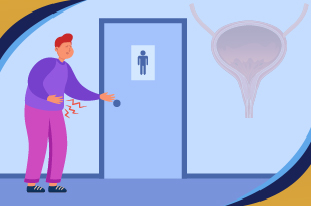Stress and anxiety are probably one of the most common things affecting modern men and women. However, while everybody gets occasional worry or nervousness, some people are much more prone to severe forms of anxiety that can interfere with their regular functioning. Out of all anxiety-related disorders, some of the most widespread include Generalized Anxiety Disorder or GAD and Panic Disorder. However, these disorders differ in their characteristics, etiology, and treatment.
In this article, we will analyze Generalized Anxiety Disorder and Panic Disorder, explain how they manifest, and tell you how to cope with them. Are anxiety attacks and panic attacks the same thing? Can you have GAD and panic disorder or not, and is panic disorder the same as anxiety or not?
What is Generalized Anxiety Disorder (GAD)?
The presence of excessive and difficult-to-control worries about multiple life domains defines Generalized Anxiety Disorder (GAD). This anxiety is generally out of proportion to the cause or event that impacts the person and may endure for years, months, and sometimes days. Those who suffer from GAD may constantly be concerned about the state of their health, their financial situation, family and friends, jobs, or other things without good cause.
Symptoms of GAD
The symptoms of GAD can vary in severity, but they typically include the following:
- Excessive Worrying: The criteria for diagnosing GAD are excessive and persistent worry. This worry is often about routine issues and can be present for as many days as six months or more.
- Restlessness or Feeling On Edge: An individual may feel anxious or on edge all the time even though there isn’t much to cause anxiety. Most of the time, people are anxious about things that have not happened, may never happen, or have happened in the past.
- Difficulty Concentrating: Long-term anxiety can prevent one from concentrating or bringing their attention to complete a task.
- Muscle Tension: Examples include tense muscles, headache, and other pain without explanation.
- Sleep Disturbances: Sleep onset, maintenance, and nonrestorative sleep problems such as delayed sleep onset, frequent awakenings, or awakenings in the early morning are common.
- Irritability: Stress, in general, causes vulnerability of the nervous system, often resulting in temperamental, unstable reactions to various stimuli.
Another feature of GAD is that the anxiety is not stimuli dependent, and it does not have objects that provoke the anxiety. The person has several things that concern them, and the struck fear and tension seem to follow the person regardless of any explicit danger or cause for concern.
What Is Panic Disorder?
Panic Disorder, on the other hand, is characterized by episodes of sudden intense apprehension, Known as panic attacks. They are random and can be devastating; their manifestations may be physically manifested and can resemble other severe illnesses such as heart attacks. Panic Disorder occurs when the unexpected, although natural, experience of feeling panic due to an impending threat is felt without the actual cause of the danger.

Symptoms of Panic Disorder
Panic Disorder involves panic attacks, that is, periods of intense fear that begin abruptly and last for no more than approximately 10 minutes. Common symptoms of a panic attack include:
- Racing Heart or Palpitations: Pounding or irregular heartbeats are commonly reported symptoms in people.
- Sweating or Trembling: The body commonly responds to it with sweating or shaking of the limbs in cold weather.
- Shortness of Breath: Shortness of breath, choking sensation, chest constriction, pain, and other similar sensations or transitory manifestations.
- Dizziness or Lightheadedness: Some people may experience a dazzling sensation or feel like they will fall.
- Nausea or Gastrointestinal Distress: Some panic attack symptoms may include nausea, faint stomach aches, or other digestion-related complications.
- Fear of Losing Control or Dying: In panic attacks, patients may exhibit great anxiety in the belief that they are in great danger of some impending calamity or of dying, though no such risk is present.
Although the primary symptom of PD is panic attacks with or without agoraphobia, these can also be exhibited in other diagnoses, including phobia and PTSD. However, in Panic Disorder, these attacks are not provoked by objects or situations that are usually associated with fear. Still, they appear suddenly, at any time, and can lead to a persistent fear of experiencing other such attacks.
Table
| Symptom | Generalized Anxiety Disorder (GAD) | Panic Disorder |
| Extreme Worry | Constant and extreme worry about little issues | Often occurs but is not a major symptom |
| Restlessness | Persistent feelings of anxiety | Only exhibits during panic attacks |
| Concentration Issues | Lack of concentration in performing tasks | Experienced only during panic attacks |
| Tension in muscles | Physical pains | Experienced only during panic attacks |
| Sleeping Issues | Insomnia | Experienced only during panic attacks |
| Irritability | Elevated irritability | Experienced only during panic attacks |
| Panic Attacks | It often occurs but is not a major symptom | Frequent and unexpected |
| Heart Palpitations | It often occurs but is not a major symptom | A major sign of panic attacks |
| Trembling | It often occurs but is not a major symptom | A major sign of panic attacks |
| Breathing Issue | It often occurs but is not a major symptom | A major sign of panic attacks |
| Fear of Dying | It often occurs but is not a major symptom | A major sign of panic attacks |
| Triggered by objects | Anxiety is not linked with particular objects or situations | Panic Attacks are not triggered due to specific objects or situations |
Key Differences Between GAD and Panic Disorder
Read More: Is Panic Disorder a Disability?
While both panic disorder vs generalized anxiety disorder involve anxiety, there are several important distinctions between them:
Nature of Anxiety:
- GAD: The anxiety in GAD is also more persistent and pervasive, as it is referred to as generalized anxiety disorder. It consists of persistent concern on matters that may be minor or insignificant within the community.
- Panic Disorder: The anxiety in panic disorder, therefore, occurs in waves in that it presents itself in episodes called panic attacks. These attacks are acute and severe; however, they are not chronic as the worry in GAD is.
Triggers:
- GAD: In GAD, the concern may not have definite causes and appears to originate from everyday life stressors. It can be seen that the anxiety generated is not always rational and, in many instances, is not even proportional to the context of the situation.
- Panic Disorder: Panic attacks in the case of Panic Disorder can be unplanned, and though there may be stimulating factors that provoke them, they are not always called forth by these stimuli. The attacks are random to a great extent.
Physical Symptoms:
- GAD: Muscle tension and restlessness are other possible manifestations of GAD, though these symptoms are less severe and more chronic than those seen in Panic Disorder.
- Panic Disorder: Signs of panic disorder are characterized by the presence of extremely uncomfortable physical sensations that are severe enough to resemble other critical medical conditions, including chest pain, shortness of breath, and dizziness.
Duration:
- GAD: Worry in GAD is generalized and must persist for at least six months.
- Panic Disorder: Panic attacks are very severe but acute; typically, they reach their climax within ten minutes and fade out within half an hour. However, the ability to perform future attacks persists for a long time.
Fear of Attacks:
- GAD: It is important to note that people with Generalized Anxiety Disorder do not fear the development or onset of certain events or experiences. Instead, they are guilty of the ordinary anxieties of life.
- Panic Disorder: For example, a person with Panic Disorder will develop a phobia of having another panic attack, and this becomes a trigger for avoidance behavior common in this Disorder.
Overlap and Comorbidity
However, it is necessary to mention that GAD and Panic Disorder can heavily overlap. People living with Panic Disorder may also experience Generalized Anxiety resulting from constant apprehension about the next panic episode to occur. On the other hand, patients with GAD may have panic attacks, particularly when worrying is at its worst. The data indicates that there is a high probability that people can suffer from both disorders and several other mental disorders, including depression and phobic disorders.
Read More: Is Social Anxiety Disorder A Disability?
Causes of GAD and Panic Disorder
Like GAD, panic disorder has other precipitating factors such as genes, biology, psychology, and environment. While the exact causes are not fully understood, some common factors that contribute to both disorders include:
- Genetics: Scientists found that people experiencing GAD or Panic Disorder are more likely to have scored a high value in a test of inherited risks for Anxiety Disorders.
- Brain Chemistry: Changes in the concentration of serotonin, norepinephrine, and gamma-aminobutyric acid (GABA) are believed to be involved in anxiety disorders.
- Stressful Life Events: Predisposing factors include Trauma, significant life changes, or ongoing stress that may precipitate or worsen GAD as well as Panic Disorder.
- Personality Traits: Longitudinal studies have also revealed that certain temperamental factors, including negative affectivity or high levels of worry, are protective factors for anxiety disorders.
Therapeutic Approaches:
More to our relief, GAD and Panic Disorder can be treated despite being chronic illnesses that affect a group of individuals in different forms, such as social anxiety. Coping strategies can be pharmacological, psychosocial, and behavioral.
- Cognitive Behavioral Therapy (CBT): Specifically, CBT firmly belongs to the first rank of treatments for both GAD and Panic Disorder. CBT helps people recognize negative cognition, change them, and learn how to handle anxious feelings.
- Medication: Selective serotonin reuptake inhibitors and serotonin-norepinephrine reuptake inhibitors aid in managing the chemical imbalance of the brain in cases of depression and generalized anxiety disorder, and benzodiazepines assist in controlling anxiety. But sometimes, therapy requires reinforcement with medication for the ultimate effect to be achieved.
- Lifestyle Modifications: Healthy exercise, sufficient nutrition, healthy amounts of sleep, and relaxation methods such as mindfulness and meditation can help moderate the actual presentation of anxiety.
- Exposure Therapy: In treating Panic Disorder, again, taking the client through exposure therapy helps them to face their fears about panic attacks in a guided manner, thereby reducing the level of fear.
Conclusion!
Both GAD and panic disorder are other related anxiety disorders that are well known to affect the well-being of an individual. This means that they have some similarities and differences. GAD is diagnosed by constant and excessive levels of worry, while in Panic disorder, one gets fearing suddenly and suddenly. Therefore, It is important that to provide an accurate diagnosis and initial treatment plan for the two, a clear differentiation should be made between them. If a person experiences anxiety, one should consult a doctor to understand what steps should be taken with the person’s particular case. Find clarity about your anxiety and panic disorder symptoms with Orange Coast Psychiatry’s expert care.
























